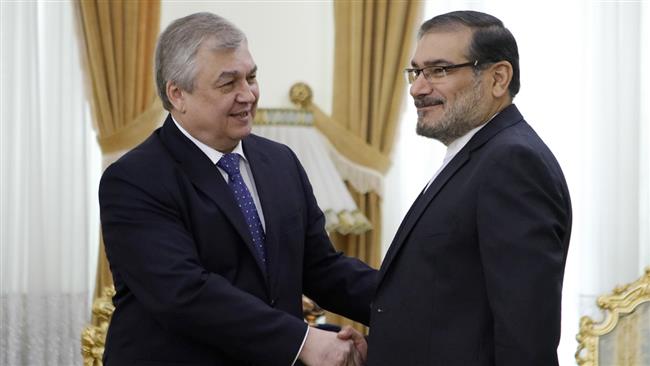
RNA - Alexander Lavrentiev, President Putin’s point man on Syria, visited with Ali Shamkhani, who is the secretary general of Iran’s Supreme National Security Council (SNSC) and is Ayatollah Khamenei’s representative at the SNSC, on Thursday.
The two discussed the latest developments regarding the conflict in Syria and stressed the importance of further political and field coordination in the Arab country.
Shamkhani is also Iran’s high representative for the coordination of joint political, military, and security activities with Syria and Russia.
Iran and Russia have both been offering the Syrian government advisory military support. Moscow has also been carrying out an aerial bombardment campaign inside Syria on behalf of Damascus. The three countries have been in close contact over their joint activities.
On Wednesday night, Iranian Defense Minister Brigadier General Hossein Dehqan sat down for talks with his Russian and Syrian counterparts, Sergei Shoigu and Fahd Jassem al-Freij, in Moscow.
During the Thursday meeting with Lavrentiev, Shamkhani said that while the Islamic Republic stressed the continuation of the fight against terrorism in Syria, it was also always committed to exploring a political solution to the conflict in the Arab country.
“We deem the military approach as effective only against those groups that refuse to lay down arms,” he said.
A nation-wide ceasefire deal has been in place in Syria since late last year. The deal, facilitated by Iran, Russia, and Turkey, excludes internationally-designated terrorist groups and other armed outfits that refuse to engage in a reconciliation process with the government.
Iran, Russia, and Turkey, which together act as the guarantor states for the Syrian ceasefire, have also been organizing political talks between the Syrian conflicting sides in a peace process in the Kazakh capital of Astana.
Shamkhani referred to those negotiations and said the armed opposition in Syria — which is a party to the Astana talks — should not be allowed to shrink from participating in the talks by inventing pretexts or as a result of incitement by certain countries opposed to peace.
The Iranian official also censured a recent US missile strike on a Syrian airfield and said the case of that violation of Syrian territory must be duly pursued.
The US fired a salvo of missiles at the Shayrat air base in Syria’s Homs Province in the early morning of April 7, alleging that the base had been used to launch what it said was a chemical raid on a militant-held town that killed over 70 people days earlier. Damascus, which has turned over its stockpile of chemical weapons under a deal between Russia and the US, denied having carried out such an attack, saying that a conventional airstrike had hit a chemical arms depot run by the militants, causing the leak of the chemical agents and the deaths.
Shamkhani said the US missile attack dimmed the prospect of reconciliation between Syrian sides and worked to encourage the terrorist groups in Syria.
He said an independent fact-finding mission had to be established to detect the paths through which chemical arms are delivered to the militants in Syria and in Iraq.
Elsewhere in his remarks, he said European countries, too, had to be concerned about the ongoing terrorism in Syria because, “like a dangerous virus, terrorism passes through borders and can’t be used instrumentally.”
Lavrentiev, for his part, commended Iran’s “constructive” role in the peace process for Syria but stressed Moscow’s commitment to militarily fighting those groups that shun the political process and continue to engage in armed activities.
He said Russia would however continue to work on the political channels on a parallel basis.
Lavrentiev is scheduled to meet with Iranian Deputy Foreign Minister Hossein Jaberi-Ansari later in the day.
Jaberi-Ansari and Lavrentiev head the Iranian and Russian delegations at the Astana talks, respectively.
847/940